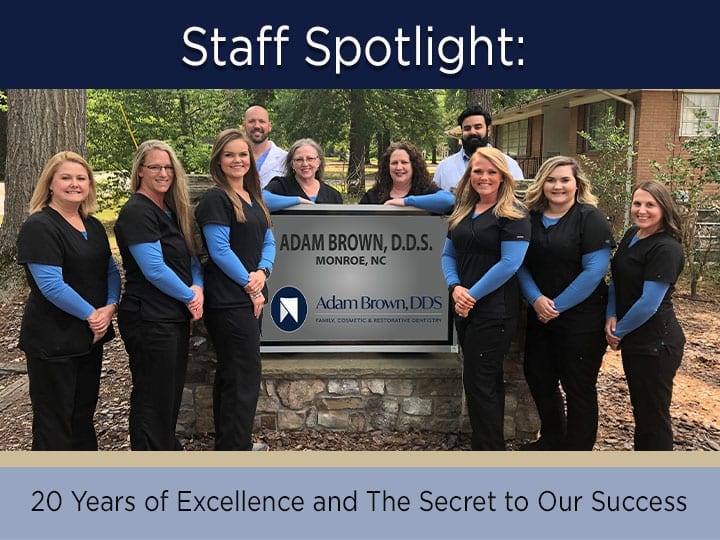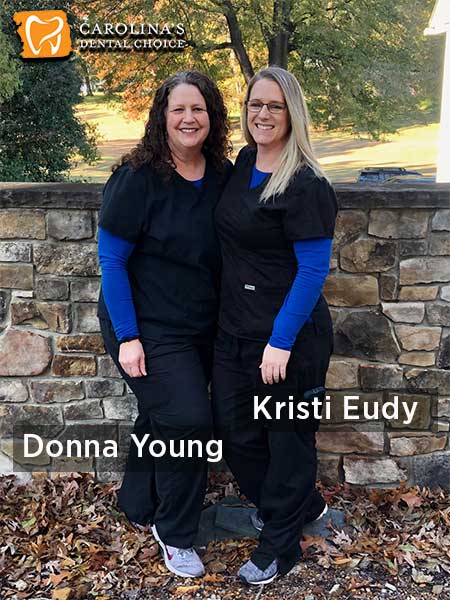
At Carolina’s Dental Choice, we know that excellent dentistry is all about the people serving you. A great dental hygienist can truly make all the difference when it comes to how your dental experience will go. Your hygienist will spend the most time working one-to-one with you, developing your baseline and initial care plan, and assessing your overall oral health and conditions related to your oral health. Because our hygienists are dedicated to providing quality dental care and getting to know their patients, we figured that our patients should get to know our hygienists.
Without further adieu, meet your Carolina’s Dental Choice hygienists, Kristi Eudy, RDH, and Donna Young, RDH.
What inspired you to choose dentistry? How did you come into healthcare?
Kristi: Growing up, I was actually one of those kids that loved going to the dentist! I was never afraid of a dental appointment, and I really liked my dental hygienist. She was a big inspiration for why I chose this field.
When I was in college, I was exploring another career path and finding that it wasn’t my thing. So after I went to UNCC for a year, I had a dentist appointment and my hygienist chatted with me about her career and why she entered the field, and that’s how I came to pursue dental hygiene! I love that my career comes back to having a really great experience with my own hygienist.
Donna: When I was a student at Wingate University, I took a part-time job cleaning dental patient rooms after treatment and working sterilization. The dental assistant actually started training and teaching me more about the field. The more time I spent there, it became clear to me that I really wanted to pursue dental hygiene. After I finished my Bachelor of Science at Wingate, I went onto dental hygiene school, obtained my license, and I’ve worked here ever since!
What’s the best part of your day?
Kristi: The best part of my day is making my patients smile and ensuring that they leave happy from our office. Even just a cleaning can make such a difference in a patient’s day; it’s so rewarding to see how a smile they’re confident in can bring out their personality.
Donna: The best part of my day, by far, is interacting with my patients! Sometimes it may be catching up on what has been going on in their lives the past six months, or sharing joys and concerns. It’s like reconnecting with longtime friends. The rewarding part is when trust is established in a relationship with a patient. Then, you have the opportunity to be real. I think patients appreciate that. They appreciate the truth, especially when it comes from an honest place.
And best of all, it’s rewarding to know I made a difference in someone’s smile, which speaks volumes.
How do you make people more comfortable at the dentist?
Kristi: At the start of an appointment, I always talk to my patients and assess if they have any fears about the dental visit. For example, if someone has a deadly fear of needles, I assure them that the appointment won’t include any needles, and the patient can see what equipment we’ll be using before we start actually using it. Just talking patients through what the appointment will entail can make them more at ease. We want to ensure our patients are comfortable for their entire experience, so if you’re ever uncomfortable or unsure about something, let your hygienist know!
Donna: The fear of dentistry is real! Dental anxiety could stem from something someone told them about the dentist or a bad experience as a kid, but we’re here to make our patients comfortable, ease them into the appointment, and talk them through their experience while they’re with us. Most often, I help talk patients through their fear. The biggest way to make our patients more comfortable is simply by talking to them.
Best dental product or technique you’d recommend?
Kristi: I recommend an electric toothbrush for all of our patients! An electric toothbrush tends to remove more plaque from your gums and teeth without you having to do more work. Even if you’re brushing thoroughly with a manual toothbrush, an electric toothbrush covers more hard-to-reach places and does a better job overall.
Donna: My top recommendations are electric toothbrushes and flossing. I really like the Oral B electric toothbrush; it does so much more than a manual brush can do. Flossing might sound simple, but it does so much more for your oral health than people think it does. There are many effective dental tools available for use, but they should be used in addition to a quality electric toothbrush and daily flossing.
Any tips or tricks for children to have better dental routines?
Kristi: I like setting a timer on their phone or having some sort of hourglass in the bathroom for brushing their teeth. Then, as long as the timer or hourglass is going, they have to brush their teeth. You want them to brush their teeth for at least 2 minutes, and make sure they brush their teeth at least every morning and every night.
Donna: I always recommend to parents that when their children are old enough to sit in a tub, to give them an age-appropriate toothbrush to hold. Kids might chew on a toothbrush and get used to the feel of it in their mouth, and adapt to the feel of toothbrush in their hand.
I also like the idea of parents and children making a routine of brushing their teeth, side-by-side, together! Maybe put on a song for the duration of brushing, and really make it a positive routine for the child. It’s important not to skip a night of brushing your child’s teeth because you’re tired or heading to bed late because then it becomes easier to fall out of routine.
So my advice overall is to always start young with your children and be consistent! And don’t forget to visit the dentist sooner rather than later with your young children, especially for preventative care – don’t wait until they have a problem to go to the dentist for the first time!
What’s a misconception that people have about dental hygiene?
Kristi: I think a common misconception is that people see us as an elective. We’re not always treated along the same line as other careers in the medical field, and I think people tend to think of hygienists in the cosmetic side, rather than as a necessity. But being a dental hygienist is so much more than plaque and tartar being scraped off every six months – dental hygiene correlates directly to the health of your whole body, not just what’s in your mouth.
Donna: Some people think we’re just cleaning their teeth, but in reality, dental hygiene is truly preventative care for much larger issues they could encounter down the road. We’re doing a whole lot more than cleaning off what you can’t do with your toothbrush.
What’s a cool part of your job that most people don’t know about? /What do you wish people knew about your position?
Kristi: Dental hygienists are always learning! We’re required to take six hours of continuing education a year in North Carolina, that you can do online or in the classroom. I’m one of those people that would be a perpetual student if I could, so being a dental hygienist means I always get to pursue my love of learning. Outside of those six hours, I also like to read weekly updates from the Registered Dental Hygienist (RDH) Magazine and Dimensions of Dental Hygiene journal.
Donna: I think what’s cool is really becoming engaged with the patient and their life, and their families. You develop deep relationships with people. I’ve been a hygienist here for 22 years and I’ve seen patients, watched their children grow, and experienced whole generations in this practice. We get to know our patients as real people and become part of their lives too – we’re not just working in their mouth every six months. It’s really incredible. Plus, when we get to know people and serve them for that many years, you already know their likes and dislikes when they’re in the chair and we can just work seamlessly together.
What’s the next big thing that makes you excited about dentistry?
Kristi: I’m really looking forward to sub-gingival air polishing! It probably doesn’t sound very cool or mean anything to people outside of dentistry, but it’s exciting because it actually goes below the gum line to remove the biofilm that hangs out under the gums and the base of the pockets. A lot of the continuing courses I take are talking more and more about this, and I’m hoping we’ll be able to implement it soon into our own bio-film removal processes.
Donna: That’s a tough question! It’s hard to pinpoint one specific thing because dentistry is always changing, and we’re constantly learning better techniques to serve our patients, and learning about new products to be more in tune with our patients’ needs. Honestly, the constant change and innovation in the field is what makes dentistry exciting to me!
